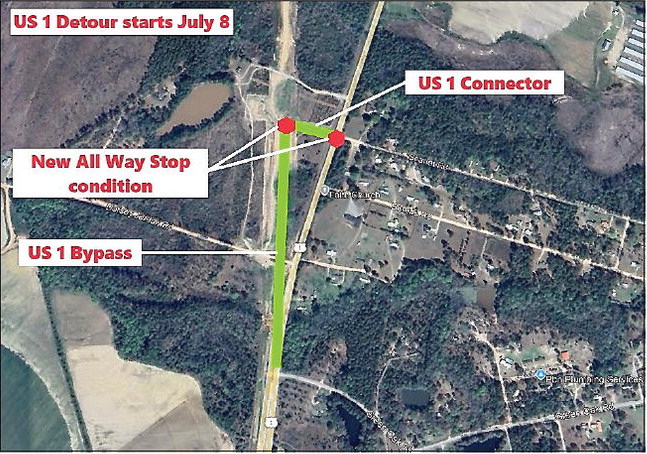Federal Funding Cuts Pose Threat to The Refuge
The director of a regional domestic violence shelter and sexual assault center based in Vidalia is appealing to state legislators for help in the wake of federal budget cuts that could compromise agency services.
In March 2020, just two weeks into the health pandemic that swept the nation, Governor Brian Kemp emphasized that domestic violence has increased by 25% in Georgia.
“He deemed domestic violence shelters as essential service providers and asked that we not close our doors so victims could continue to have access to safe havens across the state,” said Betty Dell Williams, executive director of The Refuge Domestic Violence Shelter continued from page
and Sexual Assault Center. “Since March 14, 2020, we have navigated our way through while remaining open 24/7 during a pandemic and putting our staff at greater risk of getting the virus.”
In October 2020, Congress cut the Victims of Crime Act (VOCA) funding that Georgia receives for victims’ service agencies by 28.7%, Williams said. In 2018, the state received almost $100 million in VOCA funding, but in FY21, less than half that amount—$44 million— had been set aside for victims’ services. With the upcoming 2021 cut that must be implemented to existing projects in October 2021, the Criminal Justice Coordinating Council, the agency which funds victims’ services, is planning a three-year step-down funding cut to all victims’ services providers.
The Refuge, which serves five rural Southeast Georgia counties for domestic violence and seven rural counties for sexual assault, will receive a $72,548.30 cut in VOCA funds for year one of the step-down.
If VOCA funds remain at the $44 million level in FY22, CJCC expects an additional 10% cut, which will be $65,358.32 for the local agencies. If this level holds, in FY23, an additional 12% cut is expected (for us),” Williams explained. An additional $70,509.05 loss for the two local agencies could be expected in year three. “This would be a threeyear loss of $208,415.72 for our agencies,” Williams stressed.
That kind of loss would be devastating. “Our programs have no way to recoup or replace this loss of VOCA funding. We simply cannot do more with less,” Williams said. It is estimated that across the state at least 60 victim assistance advocate positions will be cut and programs will turn away over 5,700 new Georgia residents experiencing domestic violence and/or sexual assault and who are requesting services.
In an effort to offset the loss of federal funds, Williams and others are asking state legislators to consider an additional state allocation of $2,756,354 (FY22 budget) for the 48 statecertified domestic violence and 28 state-certified sexual assault programs serving Georgia’s 159 counties. This amount would sustain the state’s network of agencies for one year.
With a $1,100,000 annual budget the local agencies maintain one shelter, one sexual assault center and an outreach office 24 hours a day, seven days a week, 365 days a year. Funding comes from federal, state and local sources. “Right now, our shelter is in good shape. We have a very giving community. But I know of two shelters in rural areas that I truly believe will have to close their doors. With the threeyear step-down, they may not be able to sustain services,” she said of shelters facing budget cuts because of the loss of federal funds. She and others are advocating for VOCA funds to be restored. “We are hoping they will see how devastating it will be for victims’ programs and will put the money back in the budget.”
Williams commended Sen. Blake Tillery, R-Vidalia, Chair of the Senate Appropriations Committee. “He did put $455,000 for domestic violence and sexual assault shelters into the amended FY 21 budget, and we appreciate that, but this money has to be spent by June 30.” Also, when divided between all of the shelters across the state, the allocation comes to a little over $5,000 per shelter.
Obviously, more is needed, but the state can only do so much. Federal funding is crucial. Shelter advocates across the state are reaching out to legislators. “Senator Tillery said he does not think the state can do the whole $2.7 million, but can do something,” Williams said.
In a weekend telephone interview, Tillery said of what the state will be able to do, “We may be able to hold it off for now, but not for the long term.” He said, historically, allocations for domestic violence shelters and sexual assault centers were funded at a 43% level by federal resources, 29% by the state, and a little over 27% locally, including donations. About 2014, the federal government kicked in $14 million a year, and after that the funding was about $105 million a year dropping to $44 million this year. “The state can supplant some of that, but we let the centers know that we are not going to be able to make up the difference over time. We will have to drop back state funding 10% a year over the next three years.”
On February 15, the governor signed an amended budget allocating $455,000 for the centers as a sort of stop gap, emergency measure, but whether the state can afford to budget the requested $2.7 million is still up in the air. “We aren’t sure yet,” Tillery said. He added that the issue would be taken up as the House Appropriations Subcommittee on Public Safety meets. In the meantime, Tillery and others have put the centers in touch with federal representatives in Washington, D.C., who may be able to help. “We appreciate the services these centers provide and we are extremely sympathetic. There is still the big budget to go,” Tillery said.
Recently, Williams sent a letter to Rachel Graber, director of Policy for the National Coalition Against Domestic Violence, enlisting her support in urging Congress to take immediate action to increase deposits into the Crime Victims Fund to prevent further severe cuts of VOCA grants. Members of the House and Senate will soon be introducing a bipartisan, bicameral bill regarding the issue.
The implications of stepping down federal funds are grim: job loss for shelter staff, suspension of services, and the impact on victims. “Not to have services available could endanger lives,” Williams said. She is hopeful that supporters will contact state and federal legislators and make their voices heard.
The Refuge Domestic Violence Shelter was initiated in 2001 as an outreach office for Wings in Dublin. In 2003, the agency acquired 501C3 status, and opened a shelter in Vidalia in 2004. The agency opened a sexual assault center in 2019. A nonprofit, nondenominational, United Way-funded organization, The Refuge has a mission is to provide emergency shelter and comprehensive support services for victims and their children hurt by domestic violence and sexual assault.





